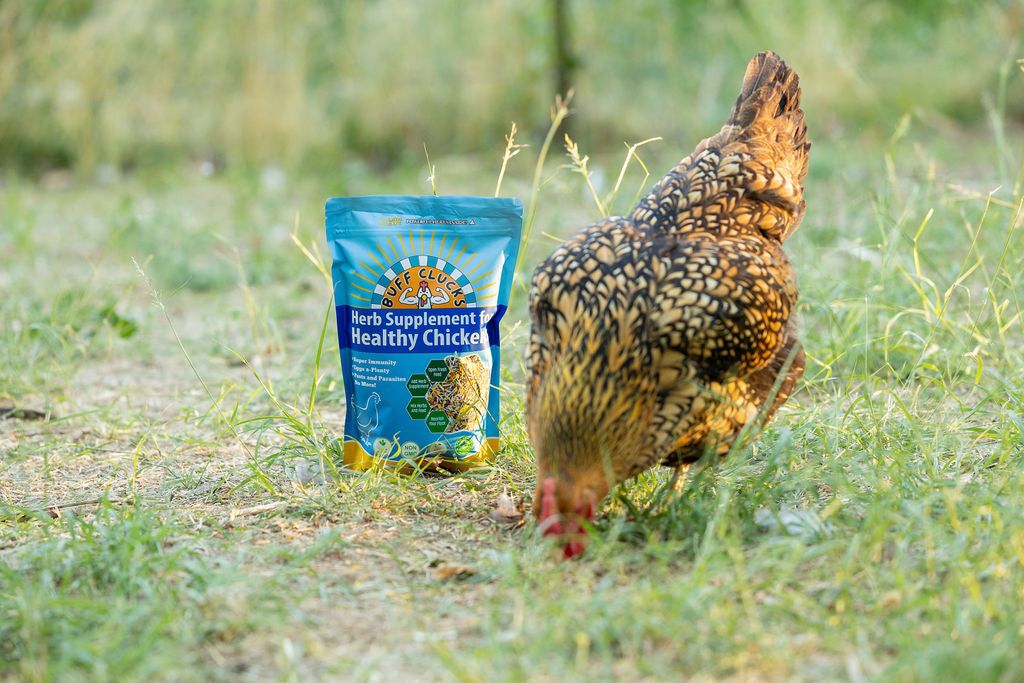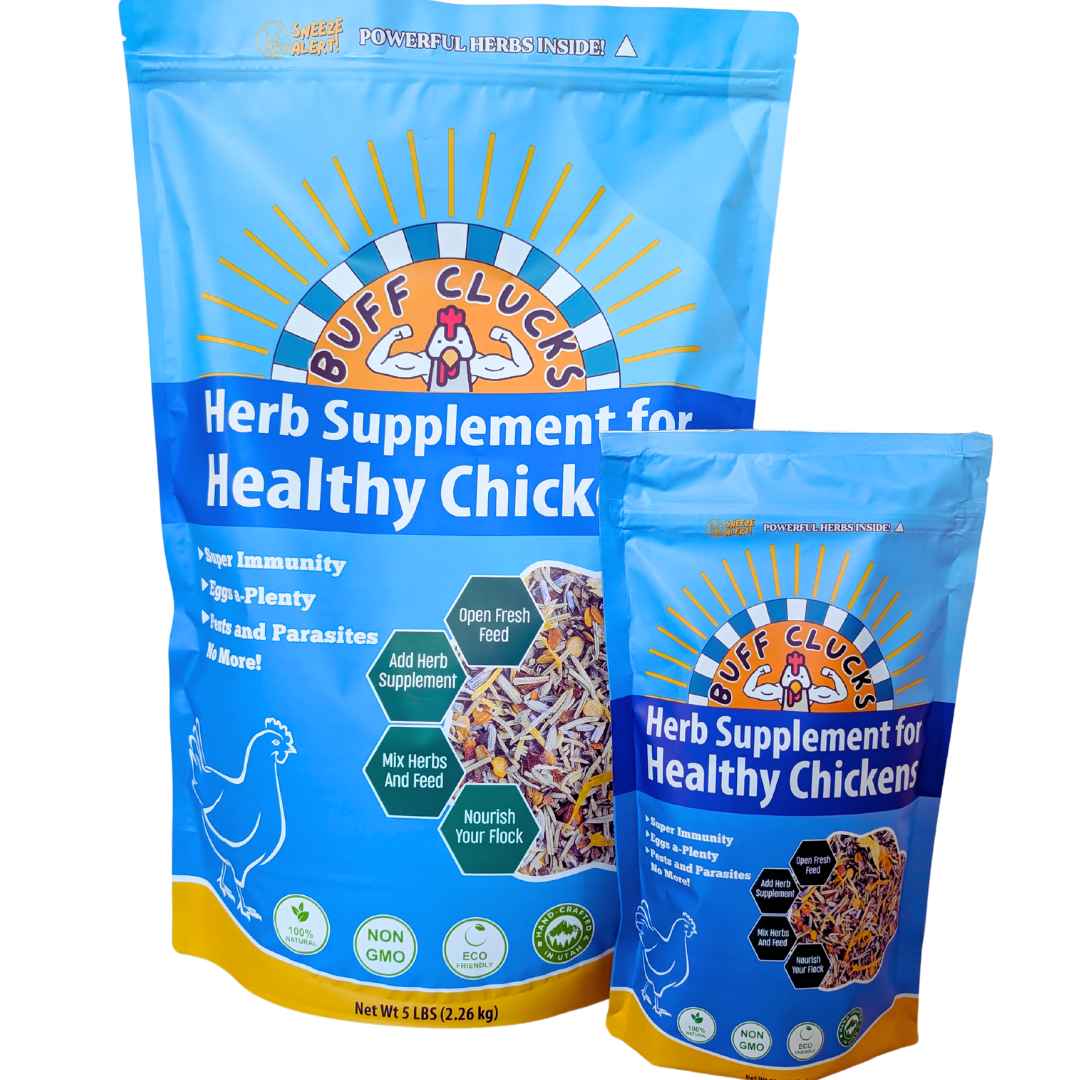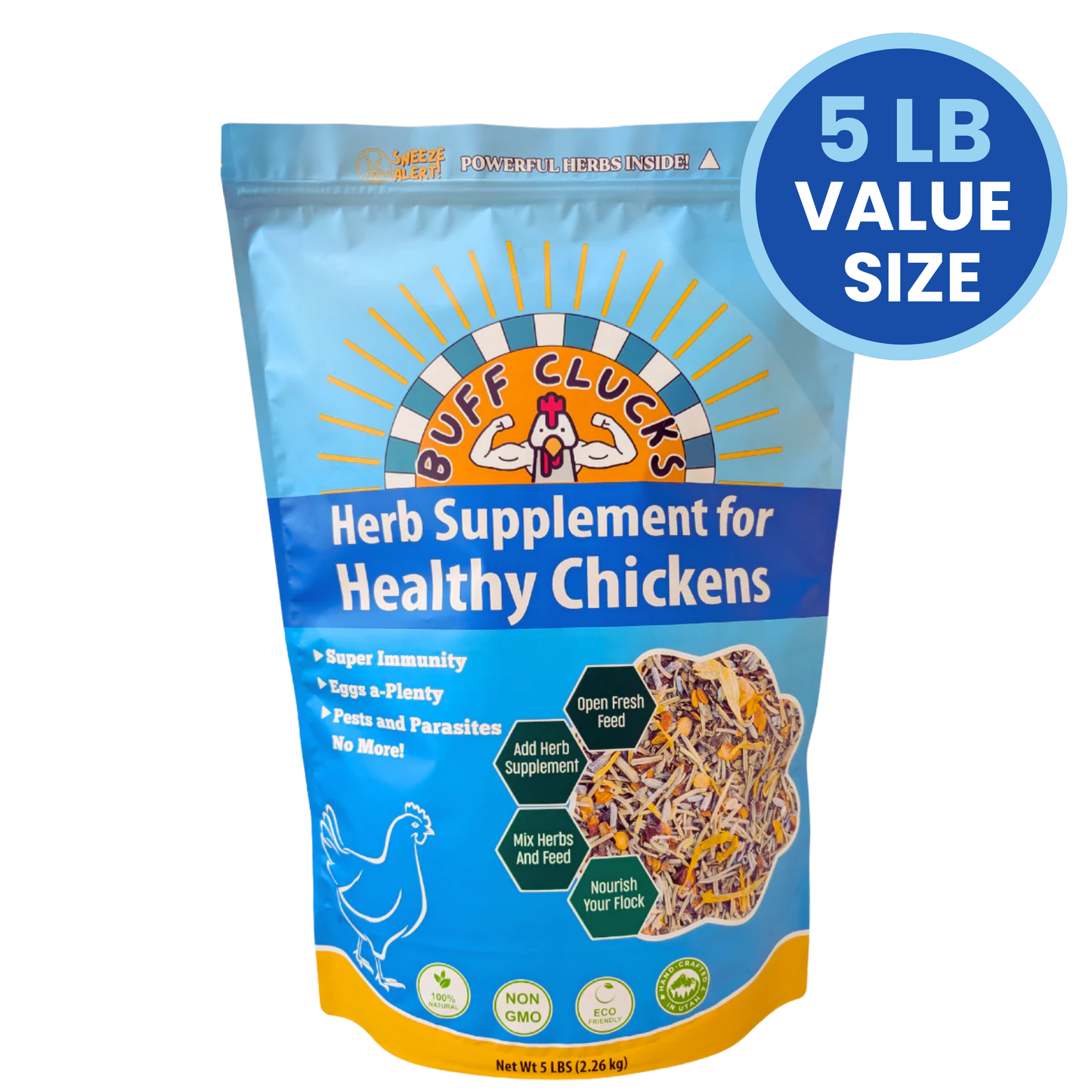
Backyard Chicken First Aid: Remedies for Common Ailments
The coop’s all clucks and feathers until one of your girls looks off... head droopy, comb pale, or walking funny like she just finished happy hour, that’s when knowing a few chicken first aid remedies turns panic into calm confidence that helps you step in like a true barnyard nurse.
You don’t need a vet degree, just a stocked first aid kit, a bit of know-how, and a sprinkle of Buff Clucks magic. Let’s peck through the most common ailments, how to spot them early, and the natural ways to help your hens bounce back.
Why Every Keeper Needs a Chicken First Aid Plan
Chickens are tough little survivors, but they’re also secretive about pain. By the time a hen shows she’s sick or injured, things might have already gone downhill. Having a chicken first aid plan means you’ll never be caught off guard when trouble strikes.
Your coop’s first aid station should include:
- Epsom salt (for detox soaks and swelling)
- Apple cider vinegar (immune support and antibacterial)
- Saline solution (for cleaning wounds)
- Vet wrap and scissors
- Buff Clucks Herb Supplement (daily wellness boost)
- Gloves, tweezers, and calm hands
Keep these on hand, and you’ll be ready for just about any cluck-up that comes your way.
Wounds and Pecking Injuries Quick Chicken Remedy
Every flock has a little drama. Whether it’s pecking order disputes or an accidental scrape, small wounds happen.
Here’s what to do:
- Gently separate the injured bird from the flock.
- Rinse the wound with saline or diluted Betadine.
- Pat it dry and apply aloe gel or a thin layer of antibacterial ointment.
- Wrap lightly with gauze and vet wrap if needed.
Keep her resting somewhere calm until healed. You can also sprinkle CoopShield around nesting boxes and dust baths; it keeps bacteria, mites, and dirt from turning a minor scratch into a major problem.

Sour Crop and Digestive Drama Chicken First Aid for Digestion
When your hen’s crop feels squishy, smells bad, or doesn’t empty overnight, she’s got a digestive jam-up. The crop should be empty each morning; if not, it’s time for some gentle help.
Remove feed for 12 hours, but give fresh water with AquaBoost for hydration and electrolytes. Massage the crop downward to help loosen anything stuck, then feed soft foods like yogurt or scrambled egg the next morning to restart digestion.
To prevent future crop chaos, always provide grit and check feed freshness. A simple change like this can make a world of difference.
Bumblefoot The Bumpy Foot Battle
That swollen, crusty lump on your chicken’s foot isn’t dirt, it’s bumblefoot, a bacterial infection that sneaks in through small cuts or rough perches. It’s common, but totally manageable.
Your natural bumblefoot care plan:
- Soak the foot in warm Epsom salt water for 10–15 minutes.
- Gently clean the spot and apply raw honey or herbal salve.
- Wrap the foot loosely with gauze and vet wrap.
Keep her bedding clean and change wraps daily until the swelling reduces. You’ll usually see improvement within a week or two.
When Your Hen Sounds Like She Has a Cold
If you hear sneezes, wheezes, or see watery eyes, it’s time to check the coop environment. Most “cold” symptoms come from dust, ammonia buildup, or poor airflow.
Swap out dirty bedding, scrub feeders, and improve ventilation. Add a spoonful of apple cider vinegar per gallon of water to boost immune health. Mixing Buff Clucks Herb Supplement into feed also helps clear mild respiratory stress. Garlic and oregano are powerful natural allies.
If things don’t improve or multiple hens start showing symptoms, it’s vet time. Respiratory infections spread faster than gossip in a henhouse.

Photo: A microscopic view of a nematode worm, a common intestinal parasite that can infect chickens and cause nutrient loss and poor health.
Worms and Parasites Chicken First Aid Remedies for Prevention
Even clean coops can end up with unwanted visitors like worms, lice, or mites. These freeloaders drain your hens’ energy, cause feather loss, and can lower egg production if left unchecked.
To keep parasites under control, maintain a clean, dry coop and replace bedding regularly. Offer dust baths so chickens can naturally rid themselves of mites and lice. Use WormStop once a month for seven days; it’s a natural dewormer made with garlic, oregano, and pumpkin seed that supports gut health and helps eliminate internal parasites safely, even during laying season.
Keep an eye on droppings and behavior, since early detection makes treatment much easier and helps your flock stay strong and productive.
When an Egg Refuses to Exit
When a hen strains, sits puffed up, and avoids the nest box, she might be egg-bound. It’s uncomfortable and can become serious if ignored.
Your egg-bound first aid steps:
- Move her somewhere warm and quiet.
- Give her a 15-minute soak in warm Epsom salt water.
- Gently massage the vent area with olive or coconut oil.
- Offer water mixed with AquaBoost to keep her hydrated.
If she hasn’t laid the egg within a few hours, don’t wait; get a vet involved. Quick action can save her life.
Feather Loss and Molting Mayhem
Molting season is basically chicken puberty in reverse, messy, moody, and full of feathers everywhere. It’s normal but stressful, especially when several hens molt at once.
Help them recover faster by increasing dietary protein and offering a variety of nutrient-dense foods such as scrambled eggs, sunflower seeds, or mealworms. Make sure they have access to grit and fresh water to aid digestion and overall health. Keep dust baths clean and dry to help them stay parasite-free while new feathers grow in.
Within a few weeks, their shiny new plumage will come in, and they’ll be strutting around like they own the place again.
Natural Chicken First Aid Remedies That Actually Work
Mother Nature knows her stuff. A few reliable ingredients can tackle almost any minor issue:
- Garlic boosts immune strength and fights internal parasites.
- Oregano supports respiratory and digestive health.
- Calendula speeds up wound healing.
- Lavender soothes stress and promotes rest.
- Apple cider vinegar maintains healthy digestion.
- Epsom salt draws out toxins and reduces inflammation.
Simple, effective, and gentle, exactly how chicken care should be.
Keep Calm and Cluck On
Chicken keeping comes with surprises, but once you know these chicken first aid remedies, you’ll handle anything like a pro. A calm keeper, a stocked kit, and a few Buff Clucks essentials are your flock’s best defense.
Keep Buff Clucks Herb Supplement, AquaBoost, WormStop, CoopShield, and GrubFuel nearby so you’re never caught off guard.
Because when things get dicey in the coop, a little preparation keeps your hens healthy, happy, and laying like champions.

























